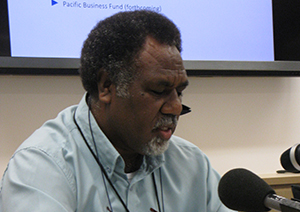
SYDNEY (Radio Australia / Pacific Media Watch): The ABC's Pacific correspondent, Sean Dorney, has been criticised by both the Fiji Media Industry Development Authority (MIDA) and the Pacific Islands News Association (PINA) for his coverage of the recent Pacific Media Summit in New Caledonia.
At the summit - which was organised by PINA - Sean reported that delegates felt the Fiji media was not as free as MIDA claimed it to be while PINA's president, Moses Stevens, accused him of being unprofessional for not getting a response to claims made against his organisation.
Sean Dorney has been speaking to Moses Stevens in Sydney to give him an opportunity to reply to PINA's critics.
Moses Stevens, the president of the Pacific Island News Association speaking to Sean Dorney.
DORNEY: Moses Stevens, the Pacific Islands News Association is now an incorporated company in Fiji. Could you explain why?
STEVENS: So it's been a long issue, starting from not only from these present executive but from past executives to re-register PINA and the way it is located now and in this case in Fiji, hopefully it will come out as we've been advised and thereby PINA moving forward in getting out its programs.
DORNEY: You have said that it will also help with transparency. How can it do that?
STEVENS: Under Fiji law, companies have to be producing financial reports, audit reports, making them available to all the members and stakeholders and I think that's the basic thing to do, but we're already doing it anyway as an Association, but I think by this we need to be secured and I think while it's in Fiji, we're compiling work within Fiji laws.
DORNEY: There's one comment I've heard you make that PINA and the media should work with governments. Could you explain that view?
STEVENS: I think media should be proactive, engaging the government, directing them, giving them the advice on how we develop a national media policies, and it's not coming from the politicians, but it's coming from the experts in the media and this where I'm coming from. I think we shouldn't be waiting for politicians to legislate us, but we taking the step, taking the lead, and say look, we can help, we'll help the government, through the government department that's responsible for media develop national media policies or laws that could guide the development of our industry into the future.
DORNEY: I've heard the view expressed that Western-style journalism is not appropriate for the Pacific. Is that your view?
STEVENS: We have cultural barriers, we have the respect of customary things, but our challenge in those of us in the media industry [is] how do we put those things together to build mutual understanding on why the media needs to report on that? So it needs a lot of education I think and advocacy on the role of the media and let the people understand it. OK, be it the rights and the respect we give to our chiefs, but if our chief does something wrong, we're independent, we have laws and under the law that is a criminal act and by law it's punishable and these thing in so many, so many island countries, that is not understood.
DORNEY: Some former members of PINA are very critical, saying that PINA has now moved away from its original purpose of defending media freedom. What is your response?
STEVENS: Yes, I think this is a result of lack of communication. the communication breakdown between former members and the present members, because we can be talking about media freedom a way we in the media, we in the industry understand it. But does our audience understand what media freedom is or the role that we play in the development of our societies. I think it is only fair that we educate them on the role that the media plays, and how they can use us and then we go about promoting media freedom. We need to have some foundation, before we go to that level.
DORNEY: One of the criticisms is that the Fiji Media Industry Development Authority exerts too much control over PINA?
STEVENS: Fiji is going through a process [of] returning to democracy and they have made some sacrifices, and some are painful, but we do understand that in life, progress sometimes gets requires some sacrifice, but I do believe that things will change in Fiji for the better.
I think we'll pull through this hurdles that we're going through now soon, and I have a strong belief in that.
This work is licensed under a Creative Commons Attribution-NonCommercial 3.0 New Zealand Licence.




